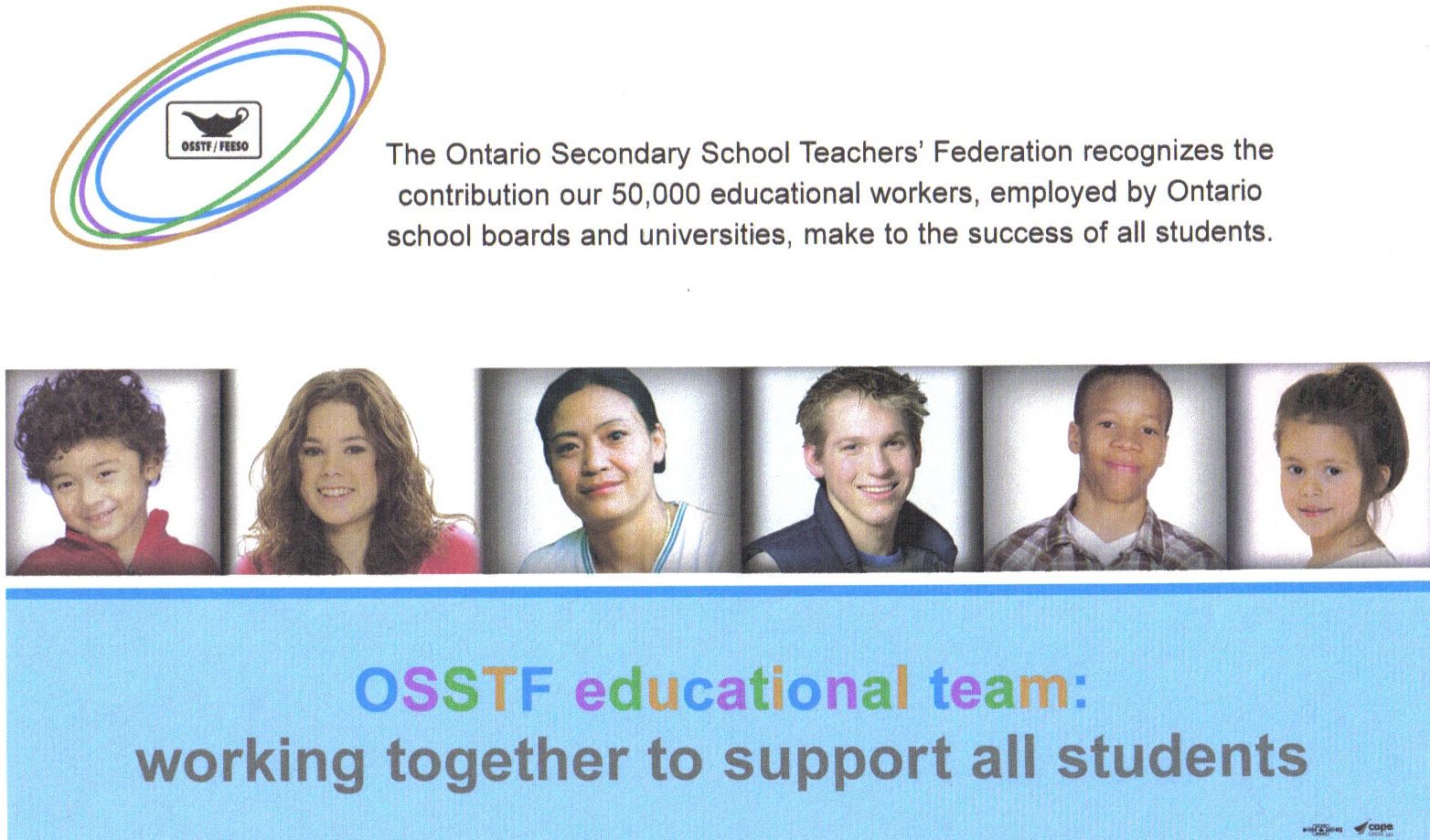
OSSTF’s “Educational
Team: working together to support all students” is based on the
following four principles of public education:
Universality: access for all students, regardless of sex,
language, culture, race, income, religion or disability;
Comprehensiveness: opportunity for all to have their needs met
Proficiency: achievement for all students;
Accountability: value for all.
Now, more than ever, in our highly complex, highly diverse society
with its demands for international competitiveness, equity and personal
fulfillment, we must create the conditions for every single student to
reach their full potential. To achieve this goal we need a full
educational team working to support our students. Many types of
educational workers are needed for a full service school model to work.
At the centre of the team is the student – the reason that the team
exists. Education is more than textbooks and curriculum. It is a life
changing experience.
Teachers: Helping to shape children’s lives
Teachers deliver the educational program to students on a daily basis
and in a variety of subject areas. Their jobs involve a number of
critical tasks including: curriculum delivery and development; lesson
planning; formal and informal evaluation; and liaising with students,
parents, support staff and administration. Teachers also interact on a
regular basis with a number of support staff personnel regarding the
special needs of their students. They deliver the extra curricular
activities students need to round out their educational experience.
Instructors: Support for lifelong learning
Instructors provide specialized programs in English as a Second
Language, literacy, basic numeracy and continuing education for adult
learners, as well as communication skills, all related to employability.
They provide upgrading to credit level and track learning progress. They
facilitate adaptation to Canadian society through the teaching of
English. Instructors help learners help themselves and their families.
Non-credit instructors provide the life enrichment courses in popular
demand.
Professional Student Services Personnel (PSSP): Professionals help
keep students in school and on the right track
These vital members of our educational team help students with learning,
education, social, emotional and communication needs. They provide the
link between students, parents and teachers to best serve the needs of
all students. Psychological staff provide assessment, diagnosis and
specialized educational plans for students with learning needs and
respond to families and children in crisis. Social workers, Attendance
Counselors, Counselling and Support Workers, First Nations Counsellors
and School Support Counsellors provide support to students and families
who are struggling with violence, abuse, neglect, suicide, attendance at
school and other social problems. Speech/language pathologists and
Educational Audiologists provide assessment, consultation, programming
and intervention for students with communication and literacy based
difficulties. Environmental Educators develop and deliver curriculum
based environmental programs to students of all ages. Research and
Assessment Associates support the school board’s decision making at the
system level by conducting research, assessment and evaluation of
projects.
Office and clerical: Primary contact
Initial contact for students and parents in a school or administrative
building often occurs with the office and clerical staff. These members
provide essential support to the safety and security of students and
other staff. They are vital links for personal communication between
home and school. Staff in central administration offices work behind the
scenes to support the education system. Student records, ministry
reporting, employer systems, even payroll, are dependent on the
expertise of these team members.
Technicians: Audio/visual and information specialists
Our technicians are fundamental to the efficient operation of our
computer systems and all technological equipment. Our libraries,
software and hardware upgrades and monitoring school/student record and
accounting systems, are increasingly dependent on the role of these
members. Without adequate computer technicians for example, school
computers quickly become useless, eliminating some of the best tools
needed to teach vital skills for the new global economy.
Custodian and trades: Clean, safe schools
Trades staff and custodians are among the most important members of our
school community. Their professionalism and knowledge of health and
safety, fire building and public health codes ensure safe, clean
comfortable learning and working environments. They bring the highly
specialized skills needed to keep increasingly sophisticated plant and
equipment in top shape.
Educational assistants: Critical support for students
Education assistants, interpreters and communication disorder assistants
provide services to our most at-risk and special needs students.
Physical, educational and social programming fosters growth in social,
behavioral and academic areas. Students are afforded the opportunity to
participate and succeed in our schools because educational assistants
facilitate a positive, safe and healthy learning environment.
Students have the right to services provided by the
educational team
District school boards in Ontario hire employees and receive funding
through the Ministry of Education. There are many cited advantages for
this practice and evidence has shown that students, parents and schools
are best served when services are provided by employees of local school
boards.
Educational employees:
●share in the vision,
goals and initiatives for student success;
●have a thorough
knowledge of and understand the complex organizational structure of the
education system;
●are members of an
educational school team providing support and expertise to school staff
on a daily basis;
●encourage and
advocate home, school and community cooperation;
●support
administrators and teachers in addressing problems which interfere with
students’ achievement;
●have access to
student information and records to plan appropriate intervention;
●are cost effective
and efficient;
●keep our schools and
workplaces healthy and safe;
●promote parent and
student participation in the education process;
●ensure that
educational goals and academic success are priorities;
●provide professional
development for all staff that is relevant and linked to the curriculum
and the educational needs of students.

![]()

